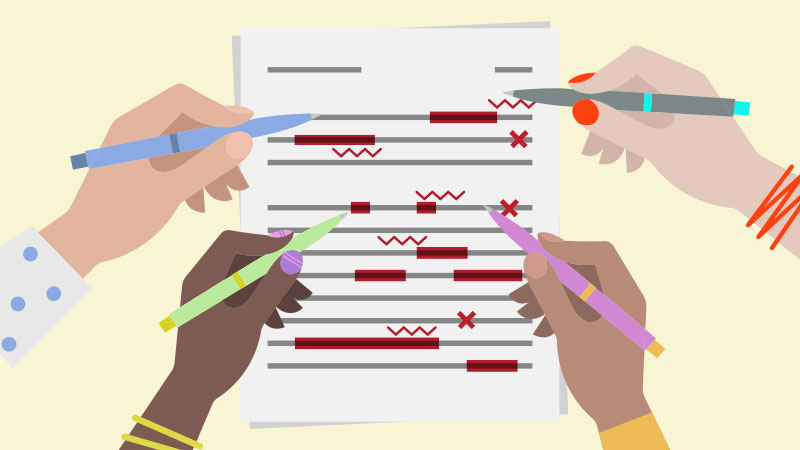
Strategies for Collaborative Writing Projects in Academic Environments
In the realm of academia, collaborative writing projects have become increasingly common. Whether it’s a research paper, a group presentation, or a joint publication, the ability to work effectively as a team is a valuable skill for students and scholars alike. However, successful collaboration in academic writing requires more than just dividing tasks; it demands careful planning, effective communication, and a shared commitment to producing high-quality work. In this blog, we’ll explore strategies for fostering productive collaboration in academic writing projects.

- Establish Clear Goals and Roles:
One of the first steps in any collaborative writing project is defining the goals and expectations. Clearly articulate the purpose of the project, the intended audience, and the desired outcomes. Additionally, assign specific roles and responsibilities to each team member based on their strengths and expertise. This ensures that everyone understands their contribution to the project and helps prevent misunderstandings down the line.
- Create a Detailed Outline:
Developing a comprehensive outline is crucial for maintaining a cohesive and organized document. Collaboratively create an outline that outlines the structure of the paper, presentation, or report. This serves as a roadmap for the project and ensures that all team members are on the same page regarding the flow of ideas and content.
- Utilize Technology for Collaboration:
Take advantage of the plethora of collaboration tools available today. Platforms like Google Docs, Microsoft Teams, or Slack allow team members to work simultaneously on a document, provide real-time feedback, and engage in discussions. This not only streamlines the writing process but also facilitates communication and enhances accountability.
- Establish Communication Protocols:
Clear and effective communication is the cornerstone of successful collaboration. Establish communication protocols early on, including preferred channels, meeting schedules, and expectations for responsiveness. Regular check-ins, whether virtual or in person, provide opportunities for team members to share progress, address challenges, and align on the project’s direction.
- Set Milestones and Deadlines:
Breaking down the project into manageable milestones with associated deadlines helps maintain momentum and ensures steady progress. Clearly define what needs to be accomplished by each milestone and allocate sufficient time for revisions and edits. This not only prevents last-minute rushes but also allows for thorough and thoughtful contributions from each team member.
- Encourage Peer Review and Feedback:
Promote a culture of constructive feedback within the team. Peer review is an invaluable aspect of collaborative writing projects, as it provides diverse perspectives and improves the overall quality of the work. Establish guidelines for providing feedback that is specific, actionable, and focused on improving the project rather than critiquing individuals.
- Manage Conflicts Effectively:
In any collaborative endeavor, conflicts may arise. It’s essential to address these conflicts promptly and constructively. Encourage open communication, active listening, and a willingness to compromise. Establishing a protocol for conflict resolution can prevent disagreements from derailing the project and help the team move forward harmoniously.
- Celebrate Achievements:
Recognize and celebrate the accomplishments of the team throughout the project. Whether it’s completing a challenging section, meeting a milestone, or submitting the final document, acknowledging the collective efforts fosters a sense of camaraderie and reinforces the value of collaboration.
Embarking on collaborative writing projects in academic settings demands a unique set of skills and resources. As students navigate the complexities of teamwork, platforms like MakeMyAssignments can serve as invaluable allies, providing essential tools and support to enhance the collaborative writing experience.
- Expert Guidance and Consultation:
MakeMyAssignments offers students access to a pool of experienced academic professionals who can provide expert guidance and consultation throughout the collaborative writing process. Whether clarifying concepts, refining arguments, or ensuring adherence to academic standards, this support ensures that the collaborative project meets the highest standards.
- Customized Assignment Help:
Collaborative projects often require a multidisciplinary approach, with team members contributing diverse skills and expertise. MakeMyAssignments can provide customized assignment help tailored to the unique needs of each project. From research assistance to writing support, students can access resources that complement their individual strengths.
- Plagiarism-Free Work:
Maintaining academic integrity is paramount in collaborative writing projects. MakeMyAssignments guarantees plagiarism-free work by employing rigorous quality checks and ensuring that all contributions are original. This commitment to authenticity not only upholds academic standards but also fosters a culture of trust within the collaborative team.
- Timely Delivery:
Meeting deadlines is a common challenge in collaborative projects, where coordination among team members is essential. MakeMyAssignments understands the importance of timely delivery and ensures that students receive their work promptly. This allows teams to stay on track and minimizes the risk of last-minute rushes.
- Revision and Editing Services:
Effective collaboration involves continuous refinement and improvement of the project. MakeMyAssignments offers comprehensive revision and editing services, allowing students to polish their work and address feedback from peers. This iterative process enhances the overall quality of the collaborative project.
- Access to Learning Resources:
MakeMyAssignments provides students with access to a wide range of learning resources, including academic journals, reference materials, and writing guides. These resources can be instrumental in supporting the research and writing phases of collaborative projects, empowering students to contribute substantively to the team’s efforts.
- Enhanced Communication Tools:
Smooth communication is essential for successful collaboration. MakeMyAssignments offers communication tools that facilitate real-time interaction between team members and academic experts. This ensures that questions are addressed promptly, feedback is exchanged efficiently, and the collaborative writing process remains cohesive.
- Confidentiality and Privacy:
Collaborative projects often involve sharing sensitive information. MakeMyAssignments prioritizes confidentiality and privacy, ensuring that students’ personal information and project details are protected. This commitment to security creates a safe environment for open communication and collaboration.
MakeMyAssignments plays a pivotal role in supporting students engaged in collaborative writing projects within academic environments. By providing expert guidance, customized assistance, and a suite of collaborative tools, this platform empowers students to navigate the complexities of joint authorship with confidence. As a reliable ally, MakeMyAssignments contributes to the success of collaborative writing projects, making the academic journey more enriching and less daunting for students.



